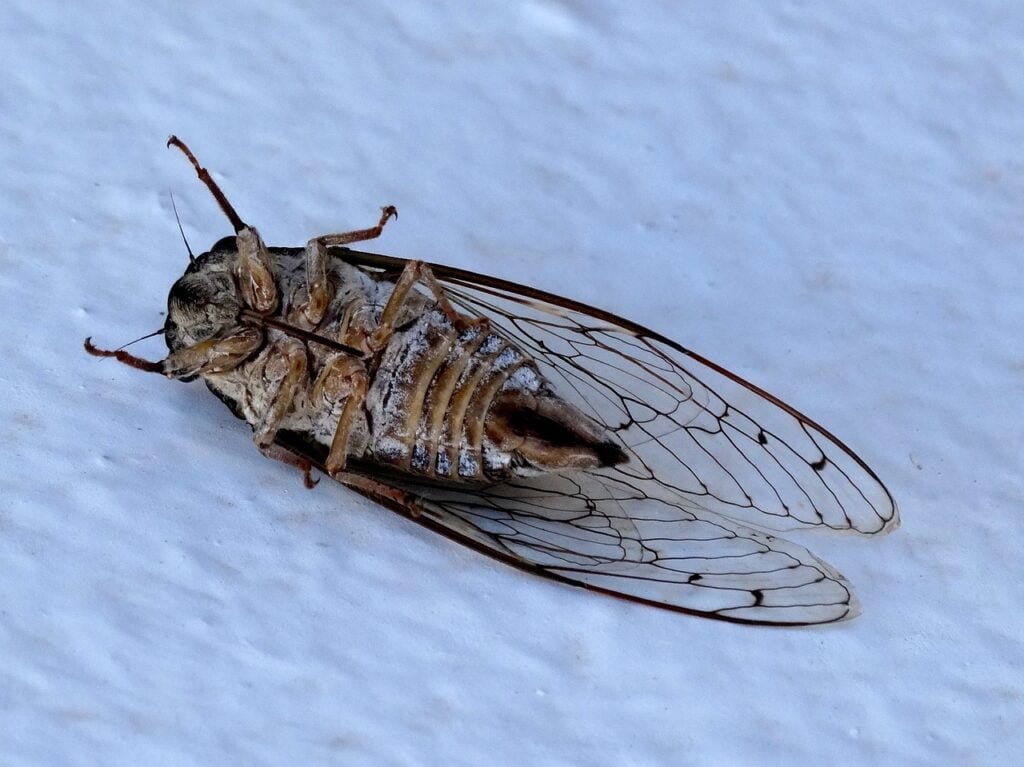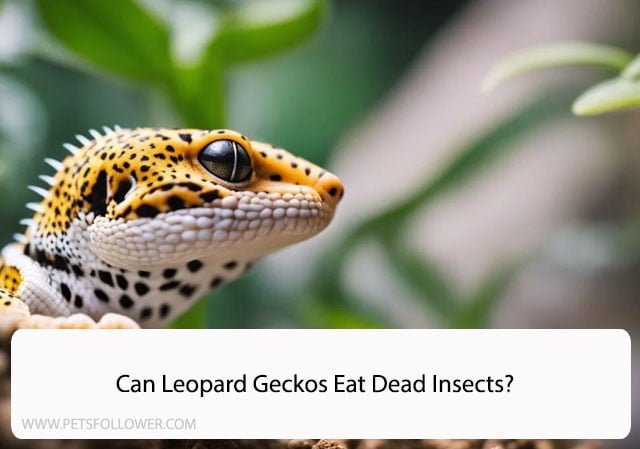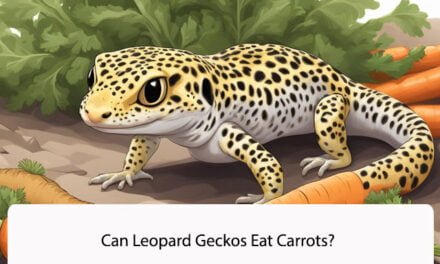Leopard geckos are one of the most popular reptiles kept as pets. They are easy to care for, have a docile temperament, and come in a variety of colors and patterns. As with any pet, it is important to provide them with a balanced and nutritious diet. One question that often arises is whether leopard geckos can eat dead insects.

The short answer is yes, leopard geckos can eat dead insects. In fact, many leopard gecko owners prefer to feed their pets pre-killed insects rather than live ones. This is because live insects can sometimes injure or even kill the gecko if they are not properly supervised during feeding. Dead insects, on the other hand, are safer and easier to handle. However, it is important to note that not all types of dead insects are suitable for leopard geckos to eat.
Dietary Basics of Leopard Geckos

Leopard geckos are insectivores, meaning they feed on insects. In the wild, they primarily eat insects such as crickets, mealworms, and waxworms. In captivity, they can be fed a variety of insects, including dead ones.
Nutritional Needs
Leopard geckos require a balanced diet to maintain their health. In addition to protein, they also need vitamins and minerals. Calcium is particularly important for leopard geckos, as it helps to keep their bones strong.
To ensure that your leopard gecko is getting the nutrients they need, it is important to feed them a variety of insects. Different insects have different nutritional profiles, so feeding a variety of insects can help to ensure that your gecko is getting a balanced diet.
Feeding Frequency
Leopard geckos should be fed every day or every other day. Young geckos should be fed more frequently than adults, as they require more food to support their growth.
When feeding your leopard gecko, it is important to provide the appropriate amount of food. Overfeeding can lead to obesity, while underfeeding can lead to malnutrition. As a general rule, you should feed your gecko as much as they can eat in 10-15 minutes.
In summary, leopard geckos require a balanced diet that includes a variety of insects. Feeding them every day or every other day can help to ensure that they are getting the nutrients they need. By providing the appropriate amount of food, you can help to keep your leopard gecko healthy and happy.
Understanding Dead Insects as Food

When it comes to feeding leopard geckos, many owners wonder if it is safe to offer dead insects. In this section, we will explore the pros and cons of feeding dead insects to leopard geckos and provide a list of acceptable types of dead insects.
Pros and Cons
Feeding dead insects to your leopard gecko can have both advantages and disadvantages. One of the main benefits is that dead insects are often easier to obtain and store than live ones. They also do not pose a risk of injury to your gecko, as live insects may bite or scratch.
However, there are also some potential drawbacks to feeding dead insects. One concern is that they may lack the nutritional value of live insects, which are often more nutrient-dense. Dead insects can also be more difficult for your gecko to digest, as they lack the natural movements and behaviors of live prey.
Types of Acceptable Dead Insects
If you do decide to feed your leopard gecko dead insects, it is important to choose the right types. Not all dead insects are safe or nutritious for your gecko. Here are some acceptable options:
- Crickets: Dead crickets are a common option for feeding leopard geckos. They are easy to find and store, and provide a good source of protein.
- Mealworms: Dead mealworms are also a popular choice. However, they are less nutritious than crickets and should be fed in moderation.
- Dubia Roaches: Dead dubia roaches are a nutrient-dense option for feeding leopard geckos. They are also less likely to cause impaction than other insects.
Overall, while feeding dead insects to your leopard gecko can be a convenient option, it is important to consider the potential pros and cons. By choosing the right types of dead insects and providing a balanced diet, you can ensure that your gecko stays healthy and happy.
Preparing Dead Insects for Feeding

As responsible pet owners, we want to ensure that our leopard geckos receive the best nutrition possible. Feeding them dead insects is a convenient option, but it’s important to prepare them properly to ensure that they are safe and nutritious for our pets.
Hydration of Insects
Dead insects can become dehydrated, which can make them difficult for leopard geckos to digest. To prevent this, we can hydrate the insects before feeding them to our pets. One way to do this is by placing the insects in a small container with a damp paper towel or cotton ball. Leave them in the container for a few hours, or overnight, to allow them to absorb the moisture.
Supplementation with Vitamins and Minerals
Dead insects may not provide all of the necessary vitamins and minerals that leopard geckos need. To ensure that our pets are getting a balanced diet, we can supplement the insects with additional vitamins and minerals. This can be done by dusting the insects with a reptile-specific vitamin and mineral supplement before feeding them to our pets. It’s important to follow the instructions on the supplement packaging and not to over-supplement, as this can be harmful to our pets.
By properly preparing dead insects for feeding, we can provide our leopard geckos with a safe and nutritious diet. Remember to always monitor your pet’s health and adjust their diet as necessary.
Safe Feeding Practices
When it comes to feeding leopard geckos, it is important to follow safe feeding practices to prevent any potential health risks. Here are some guidelines to follow:
Avoiding Contamination
It is important to avoid feeding dead insects that have been contaminated with harmful bacteria or other pathogens. This can cause serious health issues for your leopard gecko. To avoid contamination, make sure to purchase high-quality, fresh insects from a reputable supplier. Additionally, avoid leaving dead insects in your gecko’s enclosure for too long, as this can also lead to contamination.
Proper Storage Methods
Proper storage of your leopard gecko’s food is also important to prevent contamination. Store live insects in a well-ventilated container with a lid to prevent them from escaping. Keep the container in a cool, dry place, away from direct sunlight. For dead insects, store them in a separate container from live insects to prevent cross-contamination. Make sure to use them within a few days to ensure they are fresh.
By following these safe feeding practices, you can help ensure your leopard gecko stays healthy and happy.
Monitoring Your Leopard Gecko’s Health
As responsible pet owners, it is important for us to monitor the health of our leopard geckos regularly. While feeding them dead insects is generally safe, it is important to ensure that they are receiving a well-balanced diet to prevent any nutritional deficiencies.
Signs of Nutritional Deficiencies
Leopard geckos require a diet that is high in protein and calcium. If they are not receiving enough of these nutrients, they may develop nutritional deficiencies. Some signs of nutritional deficiencies include:
- Stunted growth
- Weakness or lethargy
- Difficulty shedding
- Deformed limbs or tail
- Soft or brittle bones
If you notice any of these signs, it is important to adjust your leopard gecko’s diet immediately. You may need to consult with a veterinarian or reptile specialist to determine the best course of action.
Behavioral Changes to Watch For
In addition to physical signs of nutritional deficiencies, there may also be behavioral changes that indicate your leopard gecko is not receiving a well-balanced diet. Some things to watch for include:
- Decreased appetite
- Unusual aggression or lethargy
- Changes in activity level
- Unusual hiding or basking behavior
If you notice any of these changes, it is important to monitor your leopard gecko closely and make any necessary adjustments to their diet or environment.
Overall, monitoring your leopard gecko’s health is an important part of being a responsible pet owner. By keeping an eye out for signs of nutritional deficiencies and behavioral changes, you can ensure that your leopard gecko stays healthy and happy for years to come.
Frequently Asked Questions
Are silkworms a suitable food for leopard geckos?
Yes, silkworms are a great source of protein and can be a healthy addition to a leopard gecko’s diet. They are also low in fat and easy to digest, making them a good choice for geckos with sensitive stomachs.
Is it safe for leopard geckos to consume fruits?
While fruits are not a necessary part of a leopard gecko’s diet, they can be offered as an occasional treat. However, it is important to avoid feeding geckos fruits that are high in sugar or acidic, such as citrus fruits. Stick to fruits that are low in sugar and high in fiber, such as papaya or mango.
What types of insects are appropriate for a leopard gecko’s diet?
Leopard geckos should be fed a variety of insects to ensure they are getting a balanced diet. Some suitable options include crickets, mealworms, dubia roaches, and waxworms. It is important to gut-load insects before feeding them to geckos to ensure they are getting proper nutrition.
Can leopard geckos be fed vegetables, and if so, which ones?
While leopard geckos are primarily insectivores, they can be offered small amounts of vegetables as a supplement to their diet. Some suitable options include kale, collard greens, and butternut squash. However, vegetables should never make up more than 10% of a gecko’s diet.
Are hornworms a healthy feeding choice for leopard geckos?
Hornworms are a good source of hydration for leopard geckos, as they are high in moisture content. However, they should be fed in moderation as they are high in fat. They can be a healthy addition to a gecko’s diet when fed in small amounts.
What should I do if my leopard gecko ingests a dead cricket?
If your gecko ingests a dead cricket, it is important to monitor them closely for any signs of illness or discomfort. In most cases, the gecko will pass the cricket without issue. However, if you notice any abnormal behavior or signs of illness, it is best to consult with a veterinarian.





